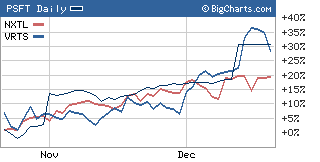
NEW YORK (CNN/Money) � The art of the deal, just like Donald Trump, has made a big comeback in the tech world. December has been delightful for fans of high profile tech mergers.
Last week alone, Oracle (Research) finally won its hostile takeover battle for rival software firm PeopleSoft (Research), Sprint (Research) agreed to buy Nextel (Research), and anti-virus software company Symantec (Research) announced a deal to purchase storage software developer Veritas (Research).
If you're keeping score at home, that's three deals worth a combined $58.8 billion the day they were announced.
And this could be just the beginning.
So many companies emerged during the boom of the 1990s that here are simply too many tech firms chasing a finite amount of tech spending dollars.
"Clearly there are a lot of industries in tech that are just begging to be consolidated," said Arnie Berman, senior technology strategist and global capital markets strategist with CreditSights. "So the question is not whether the pace of M&A picks up in 2005 but whether it will represent a breaking of the dam."
Let's make a deal
The time seems right for more mergers. Many of the strongest large cap companies, including Microsoft (Research), Cisco Systems (Research) and Dell (Research) to name a few, are sitting on large amounts of cash.
"Companies in the technology sector are clearly overcapitalized and they are going to be increasingly forced by investors to make decisions about their cash," Berman said.
And tech stocks have rallied sharply in recent months. The Nasdaq is up nearly 22 percent since mid-August. So buyers have more valuable currency to use to make deals and takeover targets appear to be more willing sell out.
"Consolidation often happens during the upturn, after companies have cleaned up their balance sheets and stabilized their business models. Market valuations may not be at their lowest, but they are still reasonably priced for an acquisition," said Bill Lesieur, director of Technology Business Research, an independent industry advisory firm, in a recent report.
So where will the most tech weddings take place next year?
More software and telecom mergers likely
Berman points to software. The Oracle-PeopleSoft merger shows that bitter rivals may have to team up to become more competitive. So expect more deals like that, where cost-savings and economies of scale are the name of the game.
 |
|
| Merger mania: Shares of PeopleSoft, Nextel and Veritas have been lifted by takeover news. |
But Berman said that software mergers would also be driven by companies seeking makeovers. Look at the Symantec-Veritas deal, for example.
That combination was more surprising because unlike Oracle and PeopleSoft, the two companies aren't really competitors. Veritas's storage software is more complimentary to Symantec's security offerings.
"This recent wave of merger news provides some of the strongest evidence yet that companies are willing to do some long-term planning. The kind of deals getting announced not just bolt-on acquisitions but transformational deals," said Berman.
With that in mind, Symantec rival McAfee (Research) could be a tempting target for a larger software company that wants to bulk up in security software.
And Berman said that EMC (Research), a storage software and hardware firm that competes with Veritas, could even be a good fit for a company like Cisco, which has been expanding its presence in storage as its core networking business starts to mature.
Speaking of networking equipment, that sector is another area that probably will see more mergers in 2005.
The Sprint-Nextel deal, on top of Cingular's purchase of AT&T Wireless earlier this year, clearly shows that telecom carriers are feeling the need to consolidate and as such, the equipment vendors that sell to these companies will likely have to follow suit.
I wouldn't be surprised if there was a flurry of Internet mergers next year too. Google (Research) is sitting on nearly $2 billion in cash as a result of its IPO earlier this year. And its stock, up about 120 percent since the IPO, is lucrative bait to use in a deal.
In addition, Barry Diller announced Tuesday that he's spinning off the travel related assets of his IAC/Interactive (Research) Internet conglomerate into a separate firm to be known as Expedia. In a letter to shareholders, Diller hinted that the split could make it easier for both companies to do even more deals.
Of course, investing in a company just because it might get taken over is a risky proposition. But even if you don't bet on a company that gets acquired, merger mania often is a positive for investors. Speculation obviously lifts the value of perceived takeover candidates. But consolidation is also a sign of confidence in the future from the companies that are making deals.
So if the pace of mergers quickens, 2005 could turn out to be a very lucrative year for tech investors -- not to mention tech investment bankers.
Sign up to receive the Tech Investor column by e-mail.
Plus, see more tech commentary and get the latest tech news.

|

